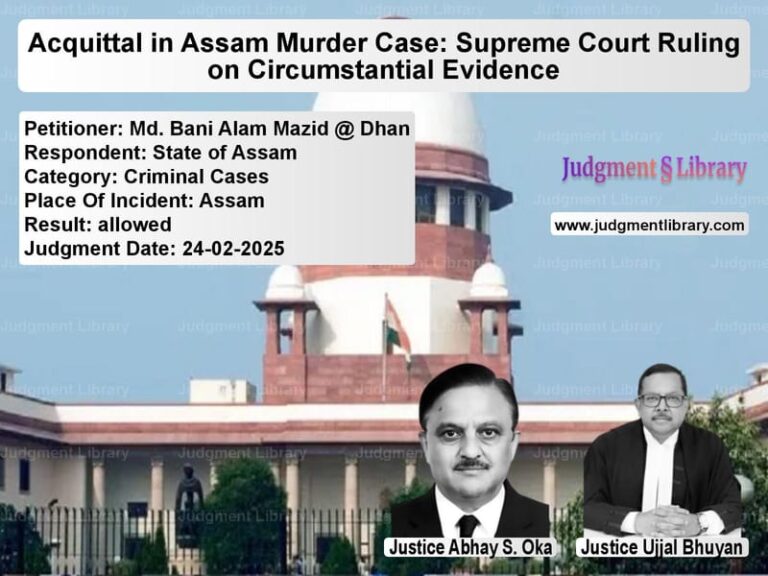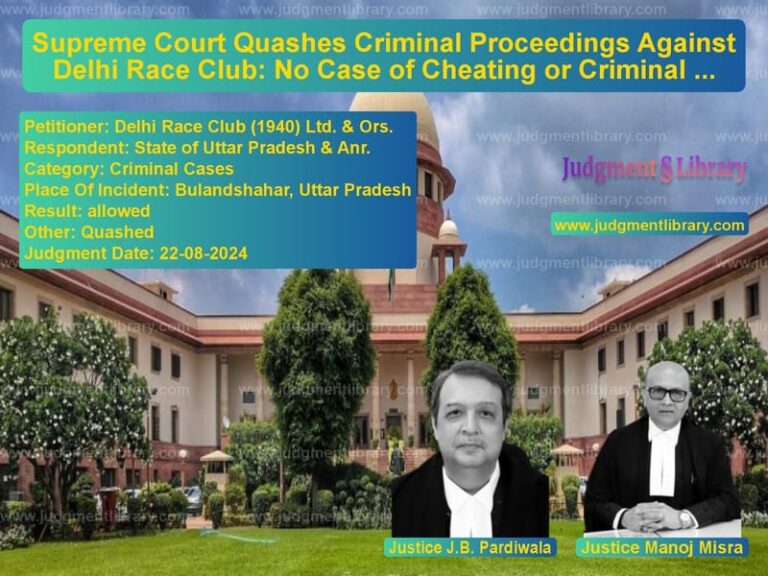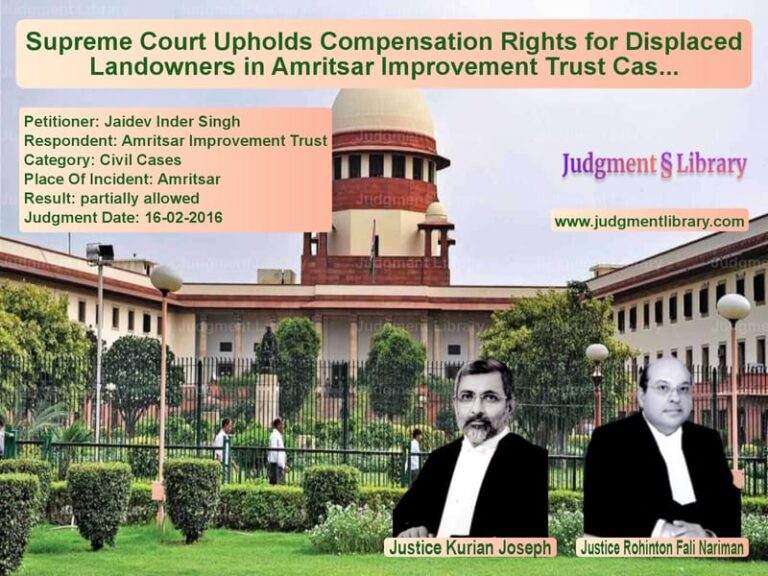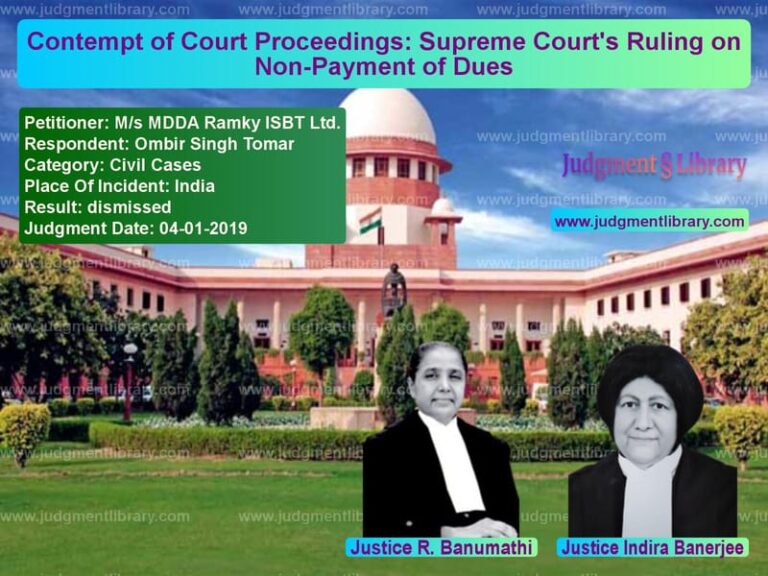Cheque Bounce Case: Supreme Court Upholds Conviction Under Negotiable Instruments Act
The case of M/s. Kalamani Tex & Anr. v. P. Balasubramanian is a significant ruling under the Negotiable Instruments Act, 1881 (NIA), specifically dealing with cheque bounce cases under Section 138. The Supreme Court was called upon to decide whether the High Court was justified in convicting the appellants after reversing an acquittal by the trial court.
The dispute stemmed from a dishonored cheque issued by the appellant company to the respondent, P. Balasubramanian. The cheque was presented but returned due to insufficient funds. Following legal proceedings, the trial court acquitted the appellants, but the High Court overturned this decision, leading to their conviction. The appellants challenged this ruling in the Supreme Court.
Background of the Case
The case originated from a business arrangement between the respondent, P. Balasubramanian, proprietor of Growell International, and the appellant company, M/s. Kalamani Tex. The two parties were engaged in a joint garment export business to France. However, due to shipment delays and payment issues from the foreign buyer, the appellants were required to pay Rs. 11.20 lakhs to the respondent.
Read also: https://judgmentlibrary.com/seamans-disability-compensation-claim-rejected-supreme-court-analysis/
To settle this amount, the appellant No. 2 (B. Subramanian) issued a cheque dated November 7, 2000, in favor of the respondent. Additionally, a Deed of Undertaking was executed the same day, in which the appellant personally acknowledged the debt.
However, when the respondent presented the cheque for clearance on December 29, 2000, it was returned due to insufficient funds. The respondent then issued a legal notice on January 8, 2001, demanding payment within 15 days. The appellants denied liability, claiming that the cheque and blank stamp papers were provided as security in an unrelated debt recovery case.
Arguments by the Petitioner (M/s. Kalamani Tex & Anr.)
The appellants contended:
- There was no legally enforceable liability at the time of issuing the cheque.
- The cheque was given as security and not for the discharge of any debt.
- The Deed of Undertaking was allegedly forged and had been misused by the respondent.
- The trial court had rightly acquitted them, and the High Court erred in reversing this decision.
Arguments by the Respondent (P. Balasubramanian)
The respondent countered:
- The appellants had admitted their signatures on both the cheque and the Deed of Undertaking.
- Since the appellants failed to rebut the presumption under Section 139 of the NIA, they were guilty of dishonoring the cheque.
- The trial court failed to consider the legal presumption that a signed cheque implies a debt.
- The business suffered financial losses due to the appellants’ failure to pay, warranting both conviction and compensation.
Supreme Court’s Analysis
The Supreme Court examined two key issues:
- Whether the High Court was justified in reversing the acquittal.
- Whether the appellants successfully rebutted the presumption of liability under Section 139 of the NIA.
1. Reversal of Acquittal
The Court ruled that the High Court had the power to overturn an acquittal if the trial court ignored material evidence or made a manifest error. It observed:
“It is trite in law that the High Court ought to have compelling reasons to tinker with an order of acquittal. However, such interference is warranted when the trial court commits a patent error of law or grave miscarriage of justice.”
The Supreme Court found that the trial court had overlooked statutory presumptions under Sections 118 and 139 of the NIA, which mandate that once a cheque is issued, it is presumed to be towards a legally enforceable debt.
2. Presumption of Liability Under Section 139
The Court ruled that the appellants failed to discharge their burden of proving that the cheque was not issued for a debt. It cited:
“The burden shifts upon the accused to discharge the presumption. The trial court erred in calling upon the complainant to explain the circumstances of liability.”
The Court noted that the appellants had admitted their signatures but failed to produce credible evidence disproving the existence of a debt.
Final Judgment
The Supreme Court upheld the High Court’s conviction of the appellants under Section 138 of the NIA and directed:
- The sentence of three months simple imprisonment awarded to appellant No. 2 was upheld.
- A fine of Rs. 5,000 imposed on both appellants was confirmed.
- The sum of Rs. 11.20 lakhs deposited by the appellants in the Supreme Court Registry was to be paid to the respondent as compensation.
- The sentence of imprisonment was waived in light of the deposit, but the conviction stood.
Legal Significance
This ruling sets crucial precedents:
- Strict Enforcement of Cheque Dishonor Laws: Courts will not entertain baseless defenses against dishonored cheques.
- Presumption of Liability: Once a cheque is signed, it is presumed to be issued for a debt unless disproven.
- High Court’s Power to Reverse Acquittals: Trial court errors in law or reasoning can justify a High Court conviction.
- Compensation as a Remedy: The Supreme Court reiterated that cheque bounce cases must balance punitive and compensatory justice.
This judgment reinforces the integrity of commercial transactions and ensures that individuals issuing cheques cannot escape liability by making unfounded claims.
Petitioner Name: M/s. Kalamani Tex & Anr..Respondent Name: P. Balasubramanian.Judgment By: Justice N.V. Ramana, Justice Surya Kant, Justice Aniruddha Bose.Place Of Incident: Tiruppur, Tamil Nadu.Judgment Date: 10-02-2021.
Don’t miss out on the full details! Download the complete judgment in PDF format below and gain valuable insights instantly!
Download Judgment: ms.-kalamani-tex-&-vs-p.-balasubramanian-supreme-court-of-india-judgment-dated-10-02-2021.pdf
Directly Download Judgment: Directly download this Judgment
See all petitions in Cheque Dishonour Cases
See all petitions in Contract Disputes
See all petitions in Judgment by N.V. Ramana
See all petitions in Judgment by Surya Kant
See all petitions in Judgment by Aniruddha Bose
See all petitions in dismissed
See all petitions in Modified
See all petitions in supreme court of India judgments February 2021
See all petitions in 2021 judgments
See all posts in Civil Cases Category
See all allowed petitions in Civil Cases Category
See all Dismissed petitions in Civil Cases Category
See all partially allowed petitions in Civil Cases Category







